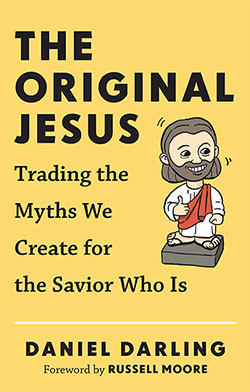Daniel Darling's Blog, page 54
April 23, 2015
The Way Home – Episode 15 featuring Bruce Ashford

Today on the podcast I have a conversation with my friend Bruce Ashford, who joined me in the studio during our recent Leadership Summit on Racial Reconciliation. Bruce is Provost and Associate Professor of Theology and Culture at Southeastern Baptist Theological Seminary in Wake Forest, NC.
Bruce and I are going to discuss his latest book, Every Square Inch. I love this book for a variety of reasons, mainly because it recovers, I believe, a biblical view of culture. I’m particularly interested in the way Bruce help us reshape our view of work. Bruce is one of the leading thinkers on the intersection of faith and culture.
Before we begin, I want to let you know about two really cool things at ERLC. First, our Leland House Press just released my ebook, Engage, Maintaining a Christian Witness Online. This is normally $2.99, but if you use the coupon code: WAYHOME, you can get it for free.
Secondly, I want to invite you to save the date, August 5, for our second annual National Conference. Our theme this year will be “The Gospel and Politics” Dr. Moore and other evangelical leaders such as Sammy Rodriguez will be discussing what Christian cultural engagement should look like especially as we head into another heated Presidential election.
I also have a coupon code for this conference as well. When you register put the coupon code: WAYHOME and get a special 15% discount.
Listen to this week’s episode of The Way Home
Show Notes
Twitter: @bruceashford
Website: betweenthetimes.com
Book: Every Square Inch: An Introduction to Cultural Engagement for Christians

April 21, 2015
Why Christians Should Be Clear
This week I’m over at the Lifeway Church Leader’s blog opining on three essential traits for countercultural Christian leaders: courage, clarity, and civility (how’s that for some serious alliteration?). This comes from 1 Peter 3:15. Here is what I said about that second point:
The second thing Peter urges for counter-cultural leaders is clarity. “Have an answer for every man” doesn’t just mean “speak up whenever you feel like it.” Instead it implies a seriousness, a soberness, a thorough grasp of theology and an ability to speak well into whatever culture you are serving.
Sometimes well-meaning, but uninformed speech actually hurts the cause. I think we saw this clearly in the latest firestorm over religious liberty. Some of the politicians called on to defend good legislation were overmatched by the questions they faced. They were not adequately prepared to give answers and defend the rights of conscience. This resulted not only in defeat, but actually retreat on the issue of religious liberty.
This is sadly the case in many areas of gospel proclamation and cultural engagement. It’s not enough for us to have the courage to stand up for what we believe. We also must work hard, study, and understand what it is we are trying to communicate. What’s more, we should continually work on honing our message in such a way that it is communicated in a way that people can understand. Frankly, we shouldn’t speak into areas where we are poorly informed. It doesn’t help the cause if we don’t know what we are talking about. Clarity matters, even more so in an increasingly hostile culture.
Consider that Paul asked the Church at Ephesus to pray for him to have clarity in his gospel presentations. If Paul was concerned about clarity, shouldn’t we care about it and pray for it? I think this should be a primary focus for the Church in the 21stcentury: praying that God would raise up courageous leaders with courage and clarity. This is what we need in an age of confusion.
You can read the whole thing here:
April 16, 2015
The Way Home – Episode 14 featuring Johnnie Moore

My friend Johnnie Moore joins me to discuss ISIS and the persecution of Christians. Johnnie is the former Vice President for Executive Projects and Media Relations and Campus Pastor of Liberty University. He has been an outspoken advocate for persecuted Christians in the Middle East and has a new book, a must read, Defying Isis. I’m grateful that Johnnie took time to join me and update us on the status of displaced Christians and how we can get involved in the effort to help our suffering brothers and sisters.
Listen to this week’s episode of The Way Home
Show Notes
Twitter: @johnniem
Websites: defyingisis.com and cradlefund.org
Book: Defying ISIS: Preserving Christianity in the Place of Its Birth and in Your Own Backyard

On the podcast I mentioned that ERLC will have a booth and be hosting an event at the Southern Baptist Convention in Columbus, Ohio, in June where we will also be hosting an event with 9Marks ministries. We encourage you to stop by and say hello and pick up some resources for your church.
I also want you to mark your calendar for August 5, 2015, we will host our second annual National Conference. This will be held in Nashville, Tenn., at the Music City Center. This year’s theme will be “The Gospel and Politics.” Russell Moore and other evangelical leaders such as Samuel Rodriguez will be discussing what Christian cultural engagement should look like, especially as we head into another heated presidential election.
If you register for this conference be sure to use coupon code: WAYHOME and get a 15% discount.
April 15, 2015
Should Pastors Have Good Friends From their Church?
At Leadership Journal I discuss the advice I received, upon ordination to ministry, to not become good friends with people in my congregation. It was well-meaning, but wrong advice, I thought at the time. Here’s an excerpt of the article:

I don’t see a detachment from people in Jesus’ public ministry. Yes, Jesus took time to get away from the crowds and be alone—something too few pastors do—but this is the same Jesus who purposefully chose, discipled, and cultivated 12 men to walk closely with him for three years. What’s more, Jesus further winnowed his inner circle to three: Peter, James, and John and had perhaps a best friend in John, often described as “the Apostle whom Jesus loved.”
So Jesus, the Good Shepherd, had good friends. He chose a best friend. How can we do less? Of course, there are a few considerations. Unlike Jesus, by choosing and forming deep friendship with a few parishioners, we can form an unhealthy bubble and be isolated from real issues and legitimate criticism. We can also send a signal that we favor, both in our preaching and in our service, certain people over others. Jesus didn’t allow his close friendships to keep him from ministry to others—and neither should we.
You can read the whole thing here.
April 11, 2015
Can You Love Jesus and Hate Jesus’ Followers?
I’m not a big bumper sticker guy, but I couldn’t help noticing the one proudly displayed on my new neighbor’s car. When I first saw it, I was excited because it said, “JESUS LOVES YOU” in large capital letters. Great! I thought. A Christian has moved in next to me. I imagined early morning Bible studies, perhaps even attending church together, exchanging prayer lists, or swapping casserole recipes for church potlucks.

But the rest of the bumper sticker gave me pause. In fine print, under the “JESUS LOVES YOU,” was a cryptic second line: “But everyone else thinks you’re a jerk.”
My neighbor is not a theologian. I’m not even sure he is a follower of Christ. But those simple lines gave me some good insight into a phenomenon that unfortunately plagues the evangelical church.
We think it’s acceptable to love Jesus and hate His followers.
The last few years have seen an explosion of books that try to separate Jesus from the church. Most of these are well-meaning efforts to distinguish genuine faith in Christ from hand-me-down, works-based religion. This is important in a culture still influenced by a nominal Christianity, where many think a ticket to heaven simply requires regular church attendance.
We pride ourselves on our independent spirit. Christianity, however, was never intended to be an individualistic faith.
But I wonder if in some ways we’ve overreached and have, in emphasizing the personal relationship with Christ, lost the holistic nature of the gospel message. America is a highly individualized nation—we pride ourselves on our independent spirit. Christianity, however, was never intended to be an individualistic faith.
Read the rest of the article here:
April 9, 2015
The Way Home – Episode 13 featuring David Platt

Today my conversation is with David Platt. David is the president of the International Mission Board of the Southern Baptist Convention, the largest mission-sending agency in the world. He is also the bestselling author of several books, including his latest, Counter Culture and the host of the popular event Secret Church.
and the host of the popular event Secret Church.
Listen to this week’s episode of The Way Home
Show Notes
Twitter: @plattdavid
Websites: radical.net and imb.org
Book: Counter Culture

On the podcast, I also mentioned a few upcoming events where you can connect with ERLC. We will be at The Gospel Coalition next week. We will also have a booth and hosting an event at the Southern Baptist Convention in Columbus in June where we will also be hosting an event with 9Marks ministries.
On August 5, 2015, we will host our second annual National Conference. This will be held in Nashville, Tenn., at the Music City Center. This year’s theme will be “The Gospel and Politics.” Russell Moore and other evangelical leaders such as Samuel Rodriguez will be discussing what Christian cultural engagement should look like, especially as we head into another heated presidential election.
If you register for this conference be sure to use coupon code: WAYHOME and get a 15% discount.
April 8, 2015
Announcing My New Book: The Original Jesus
 This September, Baker Books is releasing my sixth book, The Original Jesus. This book is a critique of ten different versions of Jesus floating around in the evangelical world. I was motivated to write this book by observing the flippant way we (and I mean we because, in some way, I’m tempted toward all of these false Jesus’ myself) talk about Christ. We have a tendency, in our modern age, to mold Jesus into our image rather than letting Jesus mold us into His.
This September, Baker Books is releasing my sixth book, The Original Jesus. This book is a critique of ten different versions of Jesus floating around in the evangelical world. I was motivated to write this book by observing the flippant way we (and I mean we because, in some way, I’m tempted toward all of these false Jesus’ myself) talk about Christ. We have a tendency, in our modern age, to mold Jesus into our image rather than letting Jesus mold us into His.
Dr. Russell Moore was kind to write the foreword. I was also honored to get endorsements from Jim Daly, Danny Akin, Trevin Wax, and several others.
Here are links to where you can pre-order it:
Here’s a brief description and a chapter outline:
This fresh look at ten “Americanized” views of Jesus reveals him not as a deity we can conform to our own comfortable image but as the Christ who transforms us.
Introduction: Play-Dough Jesus
Chapter 1: Guru Jesus – A really wise guy, slightly less than God
Chapter 2: Red-Letter Jesus – A guy much nicer than those angry prophets
Chapter 3: Brave-Heart Jesus – A really masculine dude with a hairy chest and a bad temper
Chapter 4: American Jesus – A God for the red states
Chapter 5: Free-Range Jesus – When God drove a Prius and rocked great parties
Chapter 6: Dr. Phil Jesus – He’ll fix all your problems, y’all
Chapter 7: The Prosperity Jesus – He wants to help you win and get lots of stuff
Chapter 8: Post-Church Jesus – Don’t invite this guy to church. He’s more comfortable at Starbucks
Chapter 9: BFF Jesus – He’s available to date, after you break up with your boyfriend.
Chapter 10: The Legalistic Jesus – He’ll help you find your way to Heaven, but don’t ever cross him.
April 6, 2015
Three Questions to Ask About Your Job
“Nothing matters except what happens in here.” How often have you heard that in church from well-meaning pastors? I know the message trying to be sent: the supremacy of the gospel and the importance of evangelism. I share those desires, but this kind of reductionism is not a biblical view of culture. Which is why I’m so excited about my friend, Bruce Ashford’s new book, Every Square Inch. Bruce is brilliant thinker and teacher, the Provost and Dean of the faulty at Southeastern Baptist Theological Seminary. Bruce also is Professor of Theology and Culture at SEBTS.

I had the chance to interview him for Leadership Journal. One of the questions I asked was about how a biblical view of culture affects our Monday-thru-Friday vocation:
How should an “Every Square Inch” theology affect the way we think about our Monday-thru-Friday vocations?
I encourage people to evaluate their workplace calling by asking three questions. First, they should ask, “What is God’s creational design for this type of work, for this realm of culture?” Second, “In what ways have sin and idolatry corrupted and misdirected this realm?” Third, “How can I shape my activities in this realm in light of God’s word, thereby redirecting them toward Christ?” These questions are not easy to answer. It will take much effort to discern how deep-level biblical principles might apply toward a job in, say, cinematography, elementary math education, or investment banking. It will not be easy to know how exactly to shape one’s vocation toward Christ if one is an economist, a plumber, or a Congressman. However, out of obedience to Christ and out of a desire to bear witness we will work hard to answer those questions.
Read the rest of the interview here.
April 2, 2015
The Way Home – Episode 12 featuring Scott Sauls
How should Christians think through their political engagement? Can we be both civil and courageous? This is something I’ve been talking about for some time. Which is why I’m glad to have my friend Scott Sauls on the broadcast.

Scott is the senior pastor of Christ Presbyterian Church in Nashville. Before coming to Nashville, Scott was a lead and preaching pastor at New York City’s Redeemer Presbyterian Church. He was also the founding pastor of churches in Kansas City and Saint Louis. Scott stopped by our Nashville studio to talk about his new book, Jesus Outside the Lines: A Way Forward for Those Who Are Tired of Taking Sides .
.
Listen to this week’s episode of The Way Home
Show Notes
Twitter: @scottsauls
Website: scottsauls.com
Book: Jesus Outside the Lines: A Way Forward for Those Who Are Tired of Taking Sides

March 26, 2015
The Way Home – Episode 11 featuring Bob Lepine

Even though I’m a digital native and enjoy visual media, I have a deep love for audio–both radio and podcasting. It could be from my days growing up in a family without a TV. I was glued to the radio, listening to play-by-play of the Chicago Cubs, listening to Old Time Radio classics and to Christian radio. In this case it was Moody Radio Chicago.
Today, I have the wonderful opportunity to talk with a radio broadcast veteran, one of the best voices in Christian media: Bob Lepine. Bob is the Senior Vice President and Chief Creative Officer at FamilyLife and is the longtime host of their flagship program, FamilyLife Today. He is also the voice of many other radio broadcasts, including Truth for Life with Allistair Begg and Today in the Word on Moody Radio. Bob is also a local church pastor, Redeemer Community Church in Little Rock and an author of several books. Bob is a lively conversationalist. I sat down with him during the National Religious Broadcasters Convention, where he served as the emcee of the event.Bob is a board member of the NRB as well.
We talk in depth about the medium of radio, about his perspective of the evangelical movement today, and what its like to pastor, preach and host a syndicated broadcast. I guarantee you will love this conversation.
Listen to this week’s episode of The Way Home
Show Notes
Twitter: @fltbob
Website: FamilyLife Today



